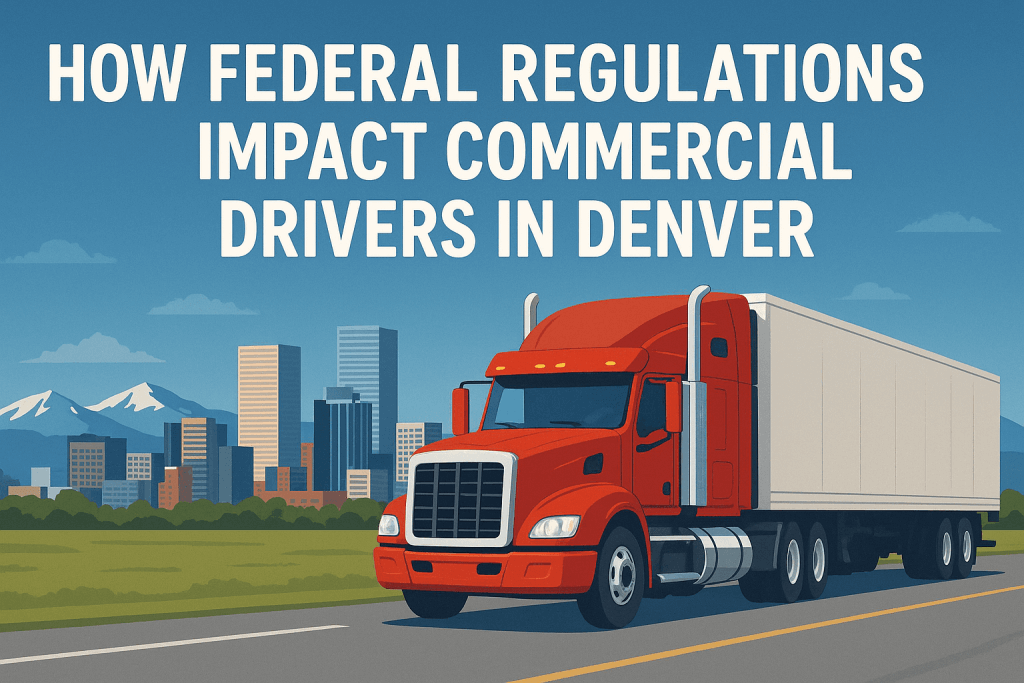Driving a commercial truck around Denver isn’t just about horsepower and hustle—it’s about following a long list of federal regulations that can seriously affect your livelihood. From how many hours you’re allowed to drive to what’s in your system when you’re stopped, there’s a lot to stay on top of. And even without an accident, a violation could still threaten your commercial license. That’s why speaking with Denver truck accident lawyers can be smart if you’re facing compliance-related legal trouble. Whether you’re a driver or a fleet operator, it pays to understand how federal rules shape your day-to-day life behind the wheel.
What Are Federal Regulations for Commercial Drivers?
Federal regulations for truckers are issued by the Federal Motor Carrier Safety Administration (FMCSA) to ensure safety and consistency across the U.S. These rules cover everything from Hours of Service (HOS) to drug testing, equipment maintenance, and driver qualifications. If you’re hauling freight through Colorado, these rules are part of your reality—whether driving through the Denver Tech Center or passing along I-25 or I-70.
Why These Rules Matter in Denver
Denver is a key transportation hub with major interstates, distribution centers, and frequent commercial traffic through the Rockies. That means drivers in this region face increased scrutiny from both federal and state regulators, especially when moving freight across state lines or navigating urban routes. Following federal rules isn’t just best practice—avoiding fines, penalties, or being pulled out of service is essential.
How Hours of Service (HOS) Rules Shape a Driver’s Day
The HOS rules are the government’s saying: “Get some rest.” They determine how long you can drive, when to take breaks, and how many hours you must be off-duty before your next shift. If you go over these limits, you’re not just risking a citation—you could be ordered off the road or flagged in a compliance review, impacting your job and safety rating.
Drug and Alcohol Testing is Non-Negotiable
If you’re a CDL holder, regular drug and alcohol testing is part of the job. You’re expected to pass whether it’s random, post-accident, return-to-duty, or pre-employment screening. A failed test doesn’t just put you on temporary leave—it can lead to a suspended or revoked CDL, forcing you off the road and into a long reinstatement process.
Vehicle Standards and Inspection Requirements
Your truck must meet federal safety standards, and Colorado enforces these rules through roadside inspections and weigh stations. Brakes, tires, lighting, load securement, and other systems must be up to code. Skipping inspections or missing routine maintenance can result in immediate violations, downtime, and steep penalties.
Federal vs. State Rules: What Denver Drivers Need to Know
When driving in Colorado—and especially in Denver—you’re dealing with both federal and state regulations. While FMCSA sets national standards, Colorado adds its own layer of enforcement. Here’s how to stay on top of both:
Colorado-Specific Considerations
Colorado DOT enforces state-level rules, including additional weight restrictions in mountain corridors, winter chain laws, and stricter environmental rules in urban areas like Denver. These regulations often stack on top of federal requirements, and failing to comply with one doesn’t excuse you from the other.
Keep Your Documentation Organized
Driver logs, inspection records, maintenance reports, and medical certifications need to be readily available in case of an audit or roadside inspection. Many Denver-based drivers use electronic logging devices (ELDs) or apps to keep digital records. If your paperwork is messy or outdated, you could face citations even if your driving is flawless.
Know Who Regulates What
The FMCSA handles licensing standards, safety ratings, and national compliance issues. Colorado DOT handles enforcement within the state and may impose additional rules for local hauls, driver rest breaks, or hazardous material transport. Knowing who to contact—and when—can save you time and frustration during disputes or audits.
How Local Lawyers Help with Federal Regulation Issues
Even without an accident, violating a federal regulation can jeopardize your license, your job, or your fleet’s reputation. That’s where local legal support makes a difference. Here’s how Denver truck accident and transportation lawyers can help:
Help With Violations and Citations
Whether you’re cited for an HOS violation, failed inspection, or paperwork error, a local lawyer can help fight the penalty or reduce the impact. They understand FMCSA regulations and Colorado’s specific enforcement practices, which can make all the difference in keeping your CDL clean.
Protect Your CDL and Career
One mistake—or even a misunderstanding—can threaten your ability to work. A Denver attorney experienced in commercial driver defense knows how to protect your license from suspension and guide you through corrective steps, hearings, or reinstatement if necessary.
Manage DOT Hearings and Audits
If you’re dealing with a Department of Transportation audit or are called into a hearing, legal support can help you prepare and represent your interests. Lawyers can assist in organizing your documentation, submitting corrections, and answering questions that might otherwise derail your compliance status.
Navigate State-Federal Overlap
With state and federal rules often overlapping—or even contradicting—it’s easy to get confused. Denver truck accident lawyers can help you understand where the laws intersect and how to stay compliant without overcomplicating your operations. They can also monitor upcoming regulatory changes to keep you ahead of the curve.
Final Thoughts
Staying compliant with federal regulations is non-negotiable for commercial drivers, and in a growing hub like Denver, it’s especially important to be on top of your game. Whether you’re hauling through snowy passes or stuck in I-25 traffic, understanding the rules and having the right legal guidance can save you time, money, and stress. Whether you’re behind the wheel or managing a fleet, staying proactive is the best way to keep your operation running smoothly.
Cassia Rowley is the mastermind behind advertising at The Bad Pod. She blends creativity with strategy to make sure ads on our site do more than just show up—they spark interest and make connections. Cassia turns simple ad placements into engaging experiences that mesh seamlessly with our content, truly capturing the attention of our audience.


